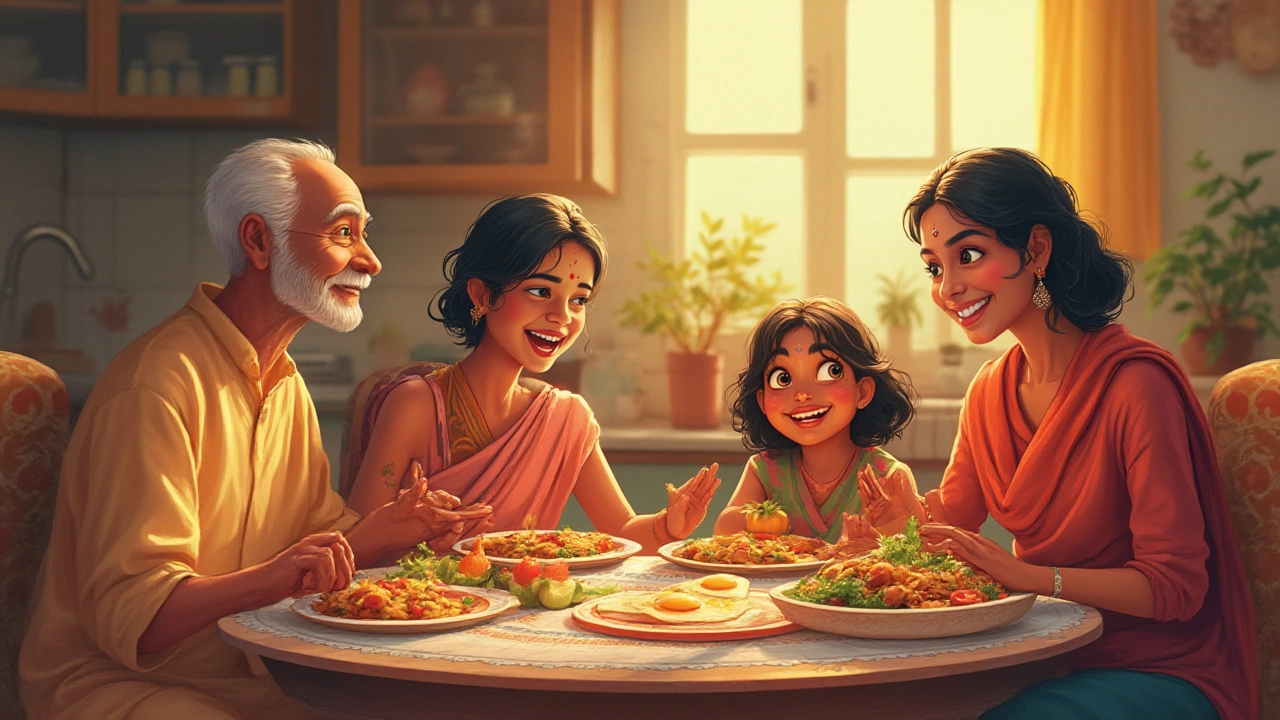Here’s a little debate that spices up family gatherings quicker than a dash of pepper: can a vegetarian eat eggs? Even among friends who pride themselves on unified veggie values, this question often draws puzzled looks, confident claims, and a healthy smattering of laughter. The answer, though, doesn’t have to be complicated. There’s a specific term for people who claim a vegetarian lifestyle but welcome eggs into their meals. That word has found a sturdy spot in Indian kitchens and conversations: eggetarian. So, what’s really behind the growing popularity of this diet—and is it truly vegetarian?
What Does 'Eggetarian' Mean?
First, some straight talk. In classic vegetarian lingo, eating eggs is a no-go. But the world isn’t just black and white—it’s bursting with shades of grey, especially when it comes to food choices and personal beliefs. That’s where 'eggetarian' steps in. This term blends ‘egg’ and ‘vegetarian’ and refers to people who avoid all meat, poultry, and fish, but eat eggs. Milk, cheese, and yogurt are usually in the mix, too.
The rise of eggetarianism is especially visible in India, where traditional vegetarianism is common, but so is a love for fluffy omelets and masala egg curries. Many who grew up in strict vegetarian households later start eating eggs for practical reasons like protein intake or taste, while still skipping meat. The term 'eggetarian' started gaining popularity in India in the 2000s, though you’ll now find it peppered throughout restaurant menus and food blogs globally. The clever coinage is India-focused but easy to relate to worldwide.
Technically, if we dig into definitions, the classic English word for a vegetarian who eats eggs is 'ovo-vegetarian'. (The Latin word for egg is ‘ovum’, hence the term.) An ovo-vegetarian eats plant foods plus eggs, but no meat or seafood. If you include milk and dairy, it's 'lacto-ovo vegetarian'. But ‘eggetarian’ rolls off the tongue easier and pops up all over Indian food culture.
- Vegetarian: Eats plant foods, no eggs/meat.
- Ovo-vegetarian: Eats plant foods and eggs.
- Lacto-vegetarian: Eats plant foods and dairy, not eggs.
- Lacto-ovo vegetarian: Eats plant foods, eggs, and dairy.
- Eggetarian: Typically means vegetarian + eggs (sometimes dairy too), mainly used in South Asia.
The next time someone says they’re vegetarians as they polish off a plate of anda bhurji, you’ll know exactly what box to tick. And if you want to sound extra cool, drop ‘eggetarian’ into the chat!
Common Myths About Vegetarians Who Eat Eggs
There’s no shortage of confusion around eggs and vegetarianism. Walk through a college canteen or browse Reddit threads on Indian food debates, and you’ll see arguments swirl. Here’s what’s pop culture fact—and what’s fiction.
- “Eggs are meat!” You’ve probably heard this from your strict vegetarian auntie. But eggs, especially the unfertilized eggs sold for food, have no animal embryo inside them—there’s no chick in there, so eating an unfertilized egg doesn’t mean killing an animal. Yet, strict vegetarians include eggs in the no-go category because they’re produced by animals.
- “Eating eggs isn’t vegetarian anywhere!” Actually, this varies by culture and personal beliefs. In many countries, eggs are grouped with meat. In India, though, a different cultural logic sometimes puts eggs in a unique bucket between meat and plants—a kind of dietary grey zone.
- “Eggs aren't healthy if you’re vegetarian.” Opposite, really. Eggs are one of the most affordable, nutrient-dense foods. They’ve got protein, vitamin B12, and choline—nutrients vegetarians often lack. The global nutrition community often recommends eggs, especially in diets where meat is absent.
- “Real vegetarians never eat eggs.” This is more of a belief than a scientific rule. Definitions of vegetarianism have shifted over time, and there’s no single worldwide standard. In Europe and America, eating eggs often falls under the vegetarian umbrella. In India, it’s still widely debated.
So if you’re happily munching on deviled eggs and calling yourself vegetarian, you’re not alone—and there’s a massive community on your side. Recent surveys in India showed that about 16% of vegetarians reported eating eggs at least sometimes, and nearly 80% of Indian vegetarian restaurants now offer egg-based dishes.

Nutritional Value of Eggs in a Vegetarian Diet
If you weigh the nutrition of eggs against typical plant-based foods, they tend to come out on top in several key areas. For vegetarians, especially in India where vitamin B12 is hard to get from plant sources, eggs can plug a serious nutrition gap. Just one medium-sized egg (about 50g) gives you about 6 grams of protein, which is more than what you’d get from a similar portion of cooked dal. That protein is what's called 'complete'—it has all the essential amino acids the body can't make on its own.
Eggs go beyond just protein. They’re packed with vitamins D and B12, both of which help everything from bone strength to keeping your nerves and brain in working order. Plus, they’re a rare source of choline, a nutrient that boosts brain health and is especially important during pregnancy.
| Nutrient (per medium egg) | Amount | % Daily Value |
|---|---|---|
| Protein | 6g | 12% |
| Vitamin B12 | 0.6mcg | 25% |
| Vitamin D | 1.1mcg | 5% |
| Choline | 147mg | 27% |
| Iron | 0.9mg | 5% |
The yolk is where all those vitamins and minerals live, while the white mainly gives you protein. Some folks skip the yolk to cut calories or cholesterol, but unless your doctor says otherwise, eating whole eggs is perfectly healthy for most. In fact, decades of research have shown no real link between moderate egg consumption and heart disease for most people.
What about those worried parents who think eggs might upset a vegetarian’s digestion? Studies show that eggs are easy on the stomach, and allergy risk is pretty low after age three. That makes them a smart, safe add-on for kids and adults alike.
If you’re transitioning from a strict vegetarian diet, eggs can also help fill common gaps. For example, plant sources of iron aren’t absorbed as easily as the iron found in eggs. Eggs also deliver a mood-boosting punch, with nutrients like folate and vitamin B6 keeping brain chemicals balanced—and you smiling at your breakfast plate.
Tips for Including Eggs in a Vegetarian Lifestyle
So you’re curious about eggs, but don’t want to give up your vegetarian creds? No worries. Being an eggetarian is less about fitting into a label, and more about eating what feels right for you. Here are some practical ways to strike the balance, enjoy your food, and keep mealtimes fun:
- Try classic Indian egg dishes if you’re new to eggs: masala omelet, egg curry, anda burji, or even simple boiled eggs with chaat masala.
- If you’re worried about flavor, start small—mix diced boiled eggs into salads, or top toast with a soft-cooked egg.
- Use eggs to power up your snacks. Egg parathas, egg-filled dosas, or even street food staples like egg frankie are perfect for busy days.
- Cook eggs with dairy for an extra protein hit–think cheesy baked egg casseroles or egg and paneer bhurji.
- Watch portion sizes. One egg a day is a good rule for most healthy adults, but you can easily mix it up with veggies or grains.
- If buying eggs, look for organic or free-range whenever you can—they’re often fresher and produced under better conditions for the hens.
- Are you keeping a fast or observing festivals? Many Indian vegetarians avoid eggs on specific days. There’s no ‘right’ answer—eat according to your beliefs.
- Curious about baking? Eggs are secret weapons in cakes, pancakes, muffins, and other treats. They add fluffiness and moisture without any extra fuss.
If you get asked, “Are you vegetarian, but you eat eggs?”—just say you’re eggetarian and carry on. Everyone’s food journey is personal. As long as you’re honest with yourself and your kitchen, you’re doing it right.
The eggy side of the vegetarian spectrum is thriving. With healthy recipes, balanced meals, and a growing tribe of eggetarians in India and worldwide, it’s clear eggs have found a welcome seat at the vegetarian table. If that means more flavor, more nutrition, and more fun on your plate—sounds like a win worth celebrating.
